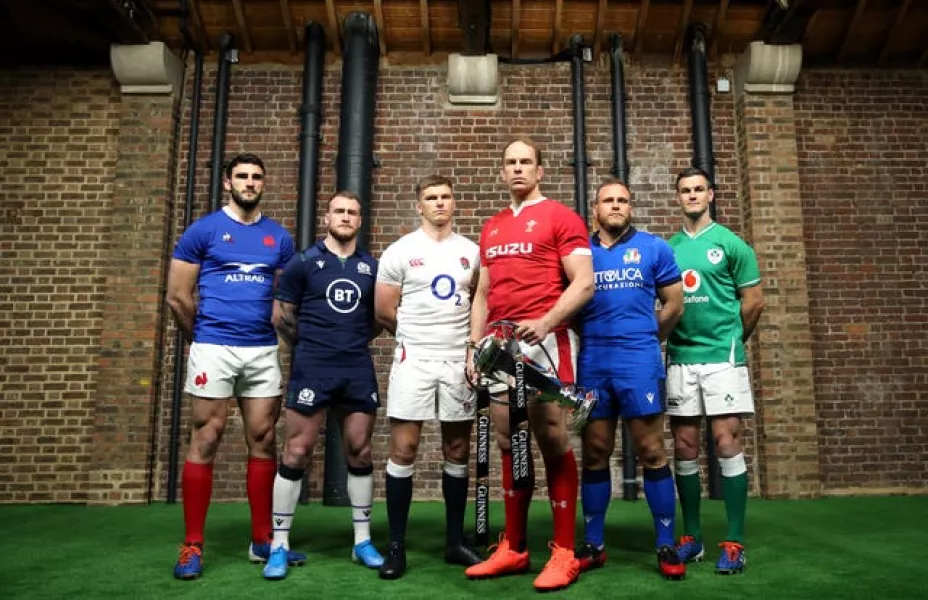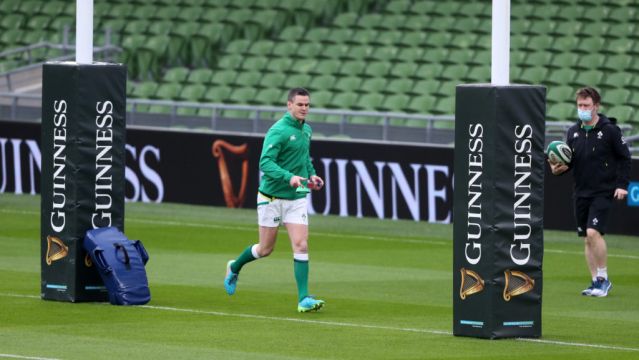References to alcohol appeared on screen every 15 seconds during one of Ireland’s Six Nations championship games at the Aviva stadium last year, a new study shows.
Research on marketing by drinks brands in the famous rugby tournament found 1,444 references to alcohol across the two matches played in Ireland in 2020.
There were 690 references, 3.8 per minute or once every 16 seconds, during the clash with Scotland, and another 754 references, 4.0 per minute or once every 15 seconds, in the game against Wales.

New restrictions on alcohol advertising in sports are set to come into force on November 12 this year, under the Public Health Alcohol Bill.
Authors of the study, Dr Richard Purves and Dr Nathan Critchlow of the University of Stirling, have asked how Ireland’s incoming rules “may influence alcohol marketing practice in future iterations of the tournament”.
In Scotland the figures were higher, with 961 references observed during their clash with England at Murrayfield Stadium in Edinburgh.
This equated to, on average, 5.1 references per broadcast minute, or approximately once every 12 seconds.
In France however, which already has similar restrictions to those Ireland will implement, there were 193 references in their fixture against England at the Stade De France in Paris.
This equated, on average, to 1.2 references a minute across the broadcast, or approximately once every 50 seconds.

However, researchers warned of a practice of “alibi marketing” that has grown prominent in France since the Evin Law, which prohibits sport sponsorship, was introduced.
The study says this practice uses “features that are linked to the brand without explicitly referring to it – a practice that has been used by tobacco companies in sport too.
“In France, the Six Nations’ lead sponsor, Guinness, uses the term ‘Greatness’ instead – with the same branding.”
The study found that this occurs in France matches despite alibi marketing appearing to be against their regulations, which prohibit “advertising [that] by its design, use of a name, trademark, advertising emblem or other distinctive sign, recalls an alcoholic beverage.”
Alibi marketing accounted for 88.1% of alcohol references in France’s game against England last year, but did not feature at all in either of the Ireland games studied.
Researchers say the use of alibi marketing in France will raises questions for the new restrictions Ireland is set to introduce this year.
“The continued presence of alibi marketing in France does have implications for the regulators and policymakers overseeing the new restrictions in Ireland, namely whether alibi marketing will also be restricted under the wording of their legislation and what arrangements are in place to monitor and enforce the restrictions” the study says.
Alcohol Action Ireland has called on the Government to ensure the practice does not spread to Ireland.
Chief executive Dr Sheila Gilheany said: “This is a great opportunity for Ireland to implement a public health policy that will reduce alcohol advertising exposure to children.
“As this report highlights, the Irish Government and public health officials need to be wary of the current loopholes we see in the French approach, and ensure our regulations protect against this.”
The Public Health Alcohol Bill, passed in 2018, introduced a number of measures on a phased basis, including minimum unit pricing, alcohol segregation in supermarkets and restrictions on advertising in near schools and on public transport.
On November 12, further restrictions will see a ban on alcohol advertising in a sports area during a sporting event, at events aimed at children or at events in which the majority of participants or competitors are children.

Research has shown that children exposed to alcohol advertising are more likely to start drinking at a younger age, and drink more heavily in later life.
In the study, a reference was defined as any visual or verbal reference to alcohol or an alcohol brand that lasted for one second or more during the broadcasted programme or commercial break.
In all four broadcasts studied, references were mostly observed during the match and in high-profile locations, including large static logos in the middle of the pitch and logos on the match equipment, such as on the ball and goal posts.
The Guinness Six Nations has been contacted for comment.







